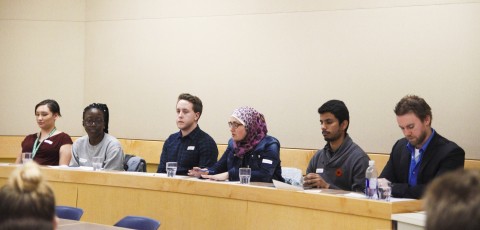
Student leaders from a variety of organizations and communities gather in Edwards School of Business to discuss their experiences on campus.
Canadians pride themselves on being part of a diverse nation, but the University of Saskatchewan may have some work to do to promote diversity on campus, according to a recent panel discussion.
USask Student Leadership, a student-led organization that organizes an annual Student Leadership Conference, is hosting the Student Leadership Workshop Series this year, focused on topics relevant to students. The most recent of these workshops, titled Diversity Discussion Panel, was held on Nov. 9 and co-hosted by USask Student Leadership, Peer Health and the Human Resources Student Society.
Evan Seebach, a second-year physics student who attended the workshop, explains how attending the discussion panel expanded his view about diversity in university.
“I [attended] the workshop to support Peer Health,” Seebach said. “It really opened my eyes to what isn’t being done.”
Members of the Indigenous Students’ Council, the International Students Association, the Ahmadiyya Muslim Students’ Association and the U of S Graduate Students’ Association were panelists, as well as representatives from the deaf and LGBTQ communities. Panelists shared their thoughts about the state of diversity on campus, which included positive aspects and also issues that they feel need to be addressed.
One topic of discussion was intersectionality, or the “overlapping and interdependent systems of discrimination or disadvantage,” according to the Oxford English Dictionary, that pertain to gender, race and class and how these intersect to create a unique set of experiences.
Naheeda Sahtout, a fifth-year PhD student in chemistry who represented graduate students at the panel, said during the event that she identifies as having an intersectional identity and explained that individuals are not defined by one aspect of their identity.
Sheldon Moellenbeck, a fifth-year psychology student representing the LGBTQ community, agreed with Sahtout, noting that he represents only one aspect of the queer community.
“There are queer people of colour, queer women, disabled queer people and any combination of identities, and I can only speak from the perspective of a white cisgender male,” Moellenbeck said.
One of the questions posed to the panel was how to make campus events more accessible to all students. Moellenbeck addressed this issue by proposing more gender-inclusive language and better accessibility to gender-neutral washrooms.
Daisy Houle, a third-year anatomy and cell biology student representing the ISC, explained that, for Indigenous students, alcohol can be a barrier for inclusion at events.
“When alcohol is present, it is not inclusive for student-parents or students who are sober for personal reasons,” Houle said.
Ausaaf Danial, a fourth-year anatomy and cell biology student representing the AMSA, discussed the need for food that caters to all dietary requirements.
“All students are bound to be friends with a diverse group of people with diverse needs. It isn’t just about having halal options, but all other dietary needs,” Danial said.
Adam Pottle, a sessional lecturer in the department of English representing the deaf and disabled community on the panel, said that there are accessibility issues for deaf students at student events, explaining that a sign-language interpreter or captioner should be made available upon request.
Shiney Choudhary, a student outreach co-ordinator with Peer Health and organizer for this event, notes that the workshop series will feature a second panel on diversity during term two, which will include more communities that were not represented during the first workshop. Another workshop will be held on the topic of resilience and reconciliation. Currently, no dates are finalized for the upcoming workshops.
Choudhary believes that all students can benefit from the series, and she welcomes any interested students to attend future workshops. Anyone can suggest a workshop topic or collaborate on a workshop by emailing USask Student Leadership at slcinfo@usask.ca.
“Every student should consider themselves a leader. Even if you just raise your hand in class, you’re a leader,” Choudhary said. “With these workshops, we want to encourage out-of-the-box thinking and build more knowledge on campus, and anyone can benefit from that.”
—
Sydney Boulton
Photo: Kate Locsin
Leave a Reply